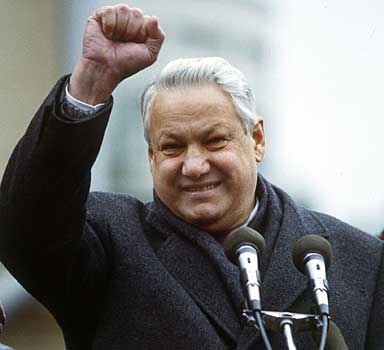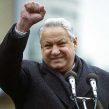
YELTSIN – THE MAN WHO CREATED CONTEMPORARY RUSSIA
Publication: Eurasia Daily Monitor Volume: 4 Issue: 81
By:

Former Russian President Boris Yeltsin died of heart failure in a Kremlin hospital on Monday, April 23. He was 76. His successor, Vladimir Putin, and other Russian and international dignitaries expressed their condolences, praised Yeltsin for creating a new democratic Russia, and many plan to attend his funeral. Mikhail Gorbachev, the last Soviet leader forced out of the Kremlin by Yeltsin in December 1991, expressed his “deepest condolences to the family of the deceased, who accomplished great deeds that benefited the nation as well as serious mistakes” (Itar-Tass, April 23).
Yeltsin’s legacy is indeed mixed. Many in Russia hate him for presiding over the breakup of the Soviet Union. The leader of the Russian Communist party, Gennady Zyuganov, told journalists that he has nothing good to say about the late Yeltsin (Itar-Tass, April 23).
Yeltsin dismantled Communist rule, recognized the independence of the new states that emerged after the Soviet collapse, did not make any territorial claims on any neighboring territories, and did not threaten to use force to redraw borders. Yeltsin believed in freedom and in a free press. Never in Russian history, before or after, were Russian journalists as free as during his presidency from 1991 to 2000.
However, Yeltsin’s rule was marred by constant political and economic instability, financial crisis, poverty, and hardship for most Russians. Yeltsin sanctioned the bloody invasion of Chechnya in 1994 and again in 1999. In 1999 Yeltsin appointed Putin to coordinate the second invasion of Chechnya as prime minister, and then on December 31, 1999, Yeltsin resigned the presidency to promote Putin as his successor.
After Yeltsin’s retirement, Russia’s fragile and inconsistent democracy soon collapsed. Putin erased press freedom, canceled or rigged elections, suppressed political opponents, and erased the independence of the judicial and legislative branches of power. While Communist-era serfdom had been replaced by Yeltsin’s unruly democracy and half-baked reforms, now the country was forced into a new form of serfdom under the guise of a market economy. Was it all worthwhile?
Yeltsin was often drunk and his burly looks and outrageous behavior scandalized foreign officials and members of the former Soviet nomenklatura, who formed the bulk of the post-Soviet bureaucracy. Still he was a strong leader. A village boy born February 1, 1931, in Sverdlovsk, an industrial region in the Urals, he made a spectacular career in the Communist party, rising all the way to the ruling Politburo.
Yeltsin was a natural-born master of political intrigue. He was well rehearsed in foreign policy matters. In November 1995 Yeltsin’s aide on foreign policy from 1992 to 1997, Dmitry Rurikov, invited me, together with three other well-known Russian political experts, to brief the president on how Russia should react to the Dayton, Ohio, peace accord that ended the war in Bosnia. Opening the session, Yeltsin turned to me and said: “You, Pavel Evgenyevich, will cover the military side.”
Just before going to the Kremlin I had phoned General Mikhail Kolesnikov, then chief of the General Staff of the Armed Forces, to ask: “What message may I pass to the president? Have you any trouble sending peacekeepers to serve in Bosnia with NATO under U.S. command?” Kolesnikov replied that Western command would not be a problem, since military leaders had decided to send a small, lightly armed brigade that could not attack anyone, no matter what orders might come from Brussels. But the military chiefs were afraid that the Russian government would not fully finance the peacekeeping operation.
I told Yeltsin that it would be wrong to oppose the Dayton agreement, even if we do not fully agree with all its clauses and he agreed. I cited the concern of military leaders that “you may send them to Bosnia and then not pay them” and Yeltsin said: “That is very important,” and wrote something in his notepad. Presidential aides sitting in a row nodded — “Good point, Pavel” — and wrote in their pads. But when Russian troops were deployed in Bosnia in January 1996, they did not get any pay for four months, which almost caused a mutiny, as Kolesnikov later told me.
The fact that First Deputy Defense Minister Kolesnikov used a journalist to convey an important message to his commander-in-chief because he did not have reliable institutional means of communication illustrates the amazingly unruly nature of Yeltsin’s administration. At the same time, Yeltsin’s decision-making was based on a number of strategic principles that provided at least basic stability.
I was present when Yeltsin was overwhelmed by highly emotional arguments that U.S. unilateralism is unacceptable and that Russia must stand up against this hegemony. Yeltsin nodded, saying, “The Americans are indeed misbehaving and we will resist them, but we will do nothing that may undermine in the slightest way our strategic partnership.” In all disagreements with the West over NATO expansion, over Yugoslavia in 1995 and 1999, Yeltsin in the end always backed off, avoiding a dangerous long-term confrontation. Yeltsin understood that Russia must be as close as possible to the West politically, economically and ideologically, or it will never transform into a modern state. Trivial issues like NATO expansion and post-Yugoslavia troubles cannot be put before core national interests.
The authoritarian Constitution Yeltsin promulgated in 1993 gave virtually unlimited power to the Kremlin, and it allowed Putin to establish authoritarian rule. Russia’s relations with the West are today the worst since the end of the Cold War and deteriorating further. Yeltsin would never have allowed this to happen, but after his resignation there was nothing he could do — a frustrating situation that has now ended.




